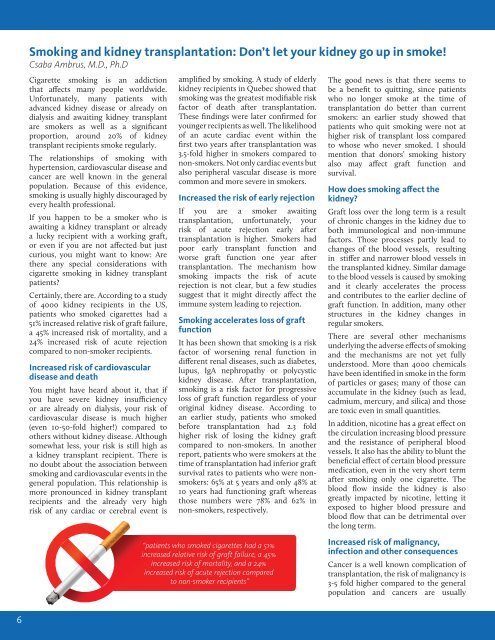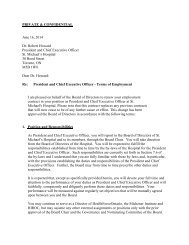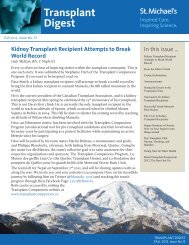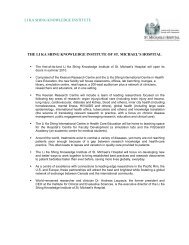Transplant Digest - Fall 2010, Issue No. 9 - St. Michael's Hospital
Transplant Digest - Fall 2010, Issue No. 9 - St. Michael's Hospital
Transplant Digest - Fall 2010, Issue No. 9 - St. Michael's Hospital
Create successful ePaper yourself
Turn your PDF publications into a flip-book with our unique Google optimized e-Paper software.
Smoking and kidney transplantation: Don’t let your kidney go up in smoke!<br />
Csaba Ambrus, M.D., Ph.D<br />
Cigarette smoking is an addiction<br />
that affects many people worldwide.<br />
Unfortunately, many patients with<br />
advanced kidney disease or already on<br />
dialysis and awaiting kidney transplant<br />
are smokers as well as a significant<br />
proportion, around 20% of kidney<br />
transplant recipients smoke regularly.<br />
The relationships of smoking with<br />
hypertension, cardiovascular disease and<br />
cancer are well known in the general<br />
population. Because of this evidence,<br />
smoking is usually highly discouraged by<br />
every health professional.<br />
If you happen to be a smoker who is<br />
awaiting a kidney transplant or already<br />
a lucky recipient with a working graft,<br />
or even if you are not affected but just<br />
curious, you might want to know: Are<br />
there any special considerations with<br />
cigarette smoking in kidney transplant<br />
patients<br />
Certainly, there are. According to a study<br />
of 4000 kidney recipients in the US,<br />
patients who smoked cigarettes had a<br />
51% increased relative risk of graft failure,<br />
a 45% increased risk of mortality, and a<br />
24% increased risk of acute rejection<br />
compared to non-smoker recipients.<br />
Increased risk of cardiovascular<br />
disease and death<br />
You might have heard about it, that if<br />
you have severe kidney insufficiency<br />
or are already on dialysis, your risk of<br />
cardiovascular disease is much higher<br />
(even 10-50-fold higher!) compared to<br />
others without kidney disease. Although<br />
somewhat less, your risk is still high as<br />
a kidney transplant recipient. There is<br />
no doubt about the association between<br />
smoking and cardiovascular events in the<br />
general population. This relationship is<br />
more pronounced in kidney transplant<br />
recipients and the already very high<br />
risk of any cardiac or cerebral event is<br />
amplified by smoking. A study of elderly<br />
kidney recipients in Quebec showed that<br />
smoking was the greatest modifiable risk<br />
factor of death after transplantation.<br />
These findings were later confirmed for<br />
younger recipients as well. The likelihood<br />
of an acute cardiac event within the<br />
first two years after transplantation was<br />
3.5-fold higher in smokers compared to<br />
non-smokers. <strong>No</strong>t only cardiac events but<br />
also peripheral vascular disease is more<br />
common and more severe in smokers.<br />
Increased the risk of early rejection<br />
If you are a smoker awaiting<br />
transplantation, unfortunately, your<br />
risk of acute rejection early after<br />
transplantation is higher. Smokers had<br />
poor early transplant function and<br />
worse graft function one year after<br />
transplantation. The mechanism how<br />
smoking impacts the risk of acute<br />
rejection is not clear, but a few studies<br />
suggest that it might directly affect the<br />
immune system leading to rejection.<br />
Smoking accelerates loss of graft<br />
function<br />
It has been shown that smoking is a risk<br />
factor of worsening renal function in<br />
different renal diseases, such as diabetes,<br />
lupus, IgA nephropathy or polycystic<br />
kidney disease. After transplantation,<br />
smoking is a risk factor for progressive<br />
loss of graft function regardless of your<br />
original kidney disease. According to<br />
an earlier study, patients who smoked<br />
before transplantation had 2.3 fold<br />
higher risk of losing the kidney graft<br />
compared to non-smokers. In another<br />
report, patients who were smokers at the<br />
time of transplantation had inferior graft<br />
survival rates to patients who were nonsmokers:<br />
65% at 5 years and only 48% at<br />
10 years had functioning graft whereas<br />
those numbers were 78% and 62% in<br />
non-smokers, respectively.<br />
“patients who smoked cigarettes had a 51%<br />
increased relative risk of graft failure, a 45%<br />
increased risk of mortality, and a 24%<br />
increased risk of acute rejection compared<br />
to non-smoker recipients”<br />
The good news is that there seems to<br />
be a benefit to quitting, since patients<br />
who no longer smoke at the time of<br />
transplantation do better than current<br />
smokers: an earlier study showed that<br />
patients who quit smoking were not at<br />
higher risk of transplant loss compared<br />
to whose who never smoked. I should<br />
mention that donors’ smoking history<br />
also may affect graft function and<br />
survival.<br />
How does smoking affect the<br />
kidney<br />
Graft loss over the long term is a result<br />
of chronic changes in the kidney due to<br />
both immunological and non-immune<br />
factors. Those processes partly lead to<br />
changes of the blood vessels, resulting<br />
in stiffer and narrower blood vessels in<br />
the transplanted kidney. Similar damage<br />
to the blood vessels is caused by smoking<br />
and it clearly accelerates the process<br />
and contributes to the earlier decline of<br />
graft function. In addition, many other<br />
structures in the kidney changes in<br />
regular smokers.<br />
There are several other mechanisms<br />
underlying the adverse effects of smoking<br />
and the mechanisms are not yet fully<br />
understood. More than 4000 chemicals<br />
have been identified in smoke in the form<br />
of particles or gases; many of those can<br />
accumulate in the kidney (such as lead,<br />
cadmium, mercury, and silica) and those<br />
are toxic even in small quantities.<br />
In addition, nicotine has a great effect on<br />
the circulation increasing blood pressure<br />
and the resistance of peripheral blood<br />
vessels. It also has the ability to blunt the<br />
beneficial effect of certain blood pressure<br />
medication, even in the very short term<br />
after smoking only one cigarette. The<br />
blood flow inside the kidney is also<br />
greatly impacted by nicotine, letting it<br />
exposed to higher blood pressure and<br />
blood flow that can be detrimental over<br />
the long term.<br />
Increased risk of malignancy,<br />
infection and other consequences<br />
Cancer is a well known complication of<br />
transplantation, the risk of malignancy is<br />
3-5 fold higher compared to the general<br />
population and cancers are usually<br />
6

















